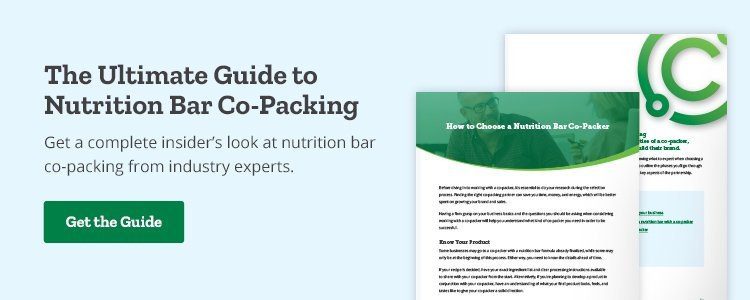
Which Certifications are Important for My Nutrition Bar Co-Packer to Have?
Which Certifications Should My Co-Packer Hold?
- Gluten-free
- Non-GMO
- Organic
- Kosher
- Safe Quality Food (SQF)
When nutrition bar companies partner with co-packers, it’s important for those co-packers to hold certain certifications. There are many different certifications and capabilities available, and choosing a co-packer that holds the right ones to help your brand improve its reach and satisfy its customers can result in a profitable and growing energy bar business.
Why Should My Co-Packer Have Certifications?
Your nutrition bar co-packer should hold certifications for a wealth of reasons. Some of the most evident include:
- Certifications demonstrate traceability and continuous improvement
- Facilities and employees related to certified products are held to a higher standard
- Certifications reduce liability for the customers
- They open customers to a wider market (many certifications target a growing health-conscious consumer base)
Which Certifications Should My Co-Packer Have?
There are certain certifications and capabilities that a good co-packer will be able to demonstrate from the beginning of your working relationship. The ideal nutrition bar co-packer follows guidelines to be:
Gluten-free
The gluten-free certification comes from the Gluten Intolerance Group (GIG). Your co-packer should help you bring your nutrition bar’s formula into compliance with GIG standards (if it’s not already). Gluten-free certification means that your finished formula contains no gluten products and is safe for consumers who have a gluten intolerance or allergy.
Non-GMO
Non-GMO products do not contain ingredients that have been genetically modified. This is also a requirement for certified organic products, so this certification can be very valuable.
Make sure your co-packer has the Non-GMO Project label; it’s the only highly-meaningful non-GMO label.
Organic
There are plenty of benefits to USDA certified organic products. They help keep farmworkers and their families safe, help maintain and purify water supply and minimize our carbon footprint, plus they also protect consumers by minimizing exposure to harmful chemicals. Some scientific evidence even shows that organic food is more nutrient-rich than its non-organic counterparts.
Certified organic status tells consumers a lot about where a product came from. The USDA organic seal is generally only on products with at least 95% organic ingredients and processing aids.
Kosher
The demand for Kosher certified products continues to grow by the year. Kosher products are an integral part of many people’s efforts to satisfy religious requirements. For some, Kosher is also a means to satisfy health and morality-based lifestyle choices.
Your co-packer should help you review your formula, submit your application, and sign the appropriate contracts to apply for the Kosher certification.
Safe Quality Food
The Safe Quality Food (SQF) certification is a worldwide food safety program. SQF is meant to help ensure certain quality standards across industry sectors. Working with a co-packing that holds an SQF certification means they have a trained on-site SQF practitioner to ensure daily compliance with food safety objectives at every step of the process.
There are individual components that make up the SQF certification:
- Verifiable proof
- Management commitment
- Documents and records control
- Product identification, traceability, withdrawal, recall
- Specification and supplier approval
- Training
- System verification
- Food defense
- Food safety system
- Allergen control
Working with an SQF certified co-packer doesn’t only provide peace of mind that your products are being processed under stringent regulations, but most large retailers now require the products they sell to be produced by an SQF certified manufacturer.
Finding the Right Co-Packer
Choosing the right nutrition bar co-packer for your brand requires some research. If you can find a co-packer who offers numerous certifications and boasts some helpful capabilities, though, it could benefit you more than you anticipate. Some consumers need to see certain certifications when they make purchases. They’re a surefire way to communicate with buyers, prioritize your customers, and keep your nutrition bars safe.

